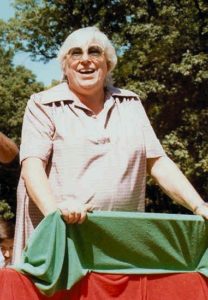Atheism is an unconventional “religion” based on the theory that there is no God. There are several definitions of atheism, but the most basic one is the following: “the denial of God“. ( Encyclopedia Americana. 604) “Atheism refers simply to the practical rejection of God”. (Encyclopedia Americana. 604) Although many people consider themselves atheists, true atheists deny not only that there is a God, but also deny the possibilities of an afterlife, the supernatural, and an immortal soul. (Microsoft Encarta Encyclopedia. positiveatheism.org. Martin. 1998) Atheism is a very complex subject.
Atheism has developed greatly since its origin in ancient times. There are two types of atheism: Rationalistic atheism and Romantic atheism. Rationalistic atheism became very well-known during the Enlightenment. “It arose out of modern confidence that scientific reason could offer an explanation of the world that made religious explanation obsolete”. (Encyclopedia Americana.604) The other type of atheism is Romantic atheism. “Romantic atheism, emerging in the 19th century was a radical protest against God as an enemy of human power and morality”. (Encyclopedia Americana. 604) These two forms of atheism show the different sides of the atheistic controversy and how it has affected people’s thoughts on the existence of God throughout the centuries.
 Historically speaking, atheism has no certain “beginning” and has been around for centuries. (Onfray.14) Although it is unclear exactly when atheism started, the first-known atheist was possibly Cristovao Ferreira, a Portuguese man who claimed he was an atheist while in Japan and who wrote the first atheistic record of his thoughts in 1614. (Onfray. 28) “The word atheist’ entered the French and English languages in the sixteenth century”. (Onfray. 15) Despite the fact that the word atheist’ came into these languages within the last five hundred years, its root word has been around for much longer. The Greek word atheos‘ came around in the seventh century BC and was used to mean “moral condemnation”. (Onfray. 15)
Historically speaking, atheism has no certain “beginning” and has been around for centuries. (Onfray.14) Although it is unclear exactly when atheism started, the first-known atheist was possibly Cristovao Ferreira, a Portuguese man who claimed he was an atheist while in Japan and who wrote the first atheistic record of his thoughts in 1614. (Onfray. 28) “The word atheist’ entered the French and English languages in the sixteenth century”. (Onfray. 15) Despite the fact that the word atheist’ came into these languages within the last five hundred years, its root word has been around for much longer. The Greek word atheos‘ came around in the seventh century BC and was used to mean “moral condemnation”. (Onfray. 15)
“Frequently, atheism is the name applied to any conviction that rejects the prevailing beliefs in the God or gods of any culture”. For example, in the Roman Empire, Christian peoples were labeled atheists’ because they did not believe in the Roman gods. (Encyclopedia Americana. 604) Being called an atheist was said to mean that someone was an undignified, immoral person. (Onfray. 22) It was not very pleasant being an atheist in earlier times and many people were put to death after being charged with atheism- including some religious figures. (Onfray. 24, 25) Atheists were martyrs for the secular cause.
Moving ahead in history, atheism was very prominent during the Enlightenment. The Enlightenment took place during the eighteenth century. (Reill. “Atheism During the Enlightenment”. Facts on File) In this period, many new ideas formed about atheism, and, Rationalistic atheism was created. (Encyclopedia Americana. 604) Like in ancient times, it was very hard to express views of atheism during the Enlightenment. “The charge of atheism was sometimes like that of heresy against anyone who publicly expressed views that did not conform to orthodox theology”. (Reill. “Atheism During the Enlightenment”. Facts on File)
“God is dead. God remains dead. And we have killed him”.
(Encyclopedia Americana. 604) Of course, there were always those outspoken atheists who did not care if they were reprimanded for their beliefs. Some of these very famous atheists were British philosopher Bertrand Russell, Sigmund Freud, and German philosopher Friedrich Nietzsche. (Microsoft Encarta Encyclopedia. positiveatheism.org Martin. 1998) Two of these men were particularly intriguing.
The earlier quote, on the subject of God’s death, was among Nietzsche’s many writings. (Encyclopedia Americana. 604) Friedrich Nietzsche was a German philosopher who rebelled greatly against Christianity. Nietzsche was raised in a Protestant family, but later took to his own ideas about atheism and religion. (Cate.1) Nietzsche conformed to the Romantic form of atheism and recreated it in his own image’. Although Nietzsche wrote many pieces on the philosophy of atheism, “Zarathustra” was a play Nietzsche wrote about a man who yelled “God is dead” to all the people around him; thus exemplifying Nietzsche’s hatred of religion. (Cate.395) “For Nietzsche this murder of God was a tremendous deed for which men could atone only by becoming gods”. (Encyclopedia Americana. 604)
Another famous atheist was that of Sigmund Freud
Sigmund Freud was born in 1856 and died in 1923. “Freud is best known for developing the psychoanalytic method for psychological therapy; including examination of the subconscious mind, dream interpretation, and hypnosis”. Sigmund Freud was raised Jewish but later became a scientific atheist. (Sheldon. “Freud, Sigmund”. Facts on File) Freud often belittled religion when comparing it to psychology. He once said: “Religion is a childhood neurosis”. (wonderfulatheistsofcfl.org. 2005) Freud believed religion was nonsensical and illogical. His belief of this is strongly exemplified in another one of his quotes: “The whole thing is so patently infantile, so foreign to reality, that to anyone with a friendly attitude to humanity it is painful to think that the great majority of mortals will never be able to rise above this view of life”. (wonderfulatheistsofcfl.org. 2005)
Throughout the years there have been many social and political issues involving atheists and atheism. Probably, though, one of the more controversial issues is prayer in public schools. Prayer in public schools is a very widespread issue, even today. “Besides prayer, many religious groups want more of a role for religion’ in the teaching of everything from history to biology”. (atheists.org. 2006) According to the American Atheists Organization, there was a very crucial court case that banned public prayer from schools.
Murray vs. Curlett, which took place in 1963, was such a case. (atheists.org. 2006) Madalyn Murray O’Hair, one of the most influential atheists of the twentieth century, was the plaintiff. Ms. O’Hair was an avid activist for the ban on prayer in public schools and fought hard in the case, which she eventually won. She wanted to show the world what she could do; and she did by winning the case. After this she devoted her entire life to the atheist cause. (atheists.org. 2006)
Atheist Madalyn Murray O’Hair
Madalyn Murray O’Hair began her atheist activism by founding the American Atheists Organization along with her son Jon and granddaughter Robin. She also wrote many pieces on atheism as well.
 Madalyn was, and still is, called “the most hated woman in America” because of her efforts to support atheism and ban prayer from public schools. Perhaps this ridicule of her family from supporters and non-supporters alike was the reason for her, her son’s, and granddaughter’s disappearance in 1995 with at least $600,000 believed to have been stolen by the O’Hairs from the American Atheists’ fund. This disappearance of one of the most important atheists in history, and her family, rattled the entire organization. (www.atheists.org. 2006)
Madalyn was, and still is, called “the most hated woman in America” because of her efforts to support atheism and ban prayer from public schools. Perhaps this ridicule of her family from supporters and non-supporters alike was the reason for her, her son’s, and granddaughter’s disappearance in 1995 with at least $600,000 believed to have been stolen by the O’Hairs from the American Atheists’ fund. This disappearance of one of the most important atheists in history, and her family, rattled the entire organization. (www.atheists.org. 2006)
The O’Hairs were not heard from for six years until one day one of their former employees confessed to murdering them. Their bodies were found burned, by the police in 2001. The O’Hairs were buried in their hometown in Texas. Although she is gone, Madalyn Murray O’Hair remains crucial to twentieth-century atheism and to the American Atheists. (atheists.org. 2006)
In essence, as atheism continues to be a controversy, it is still an important part of our culture. Atheism has formed many opinions in the minds of people since the earliest times and will keep doing so into the future. It should not be forgotten. Atheism, in the minds of various atheists, is a true virtue of mankind. This virtue is shown in the words of Madalyn Murray O’Hair: “[An Atheist] He seeks to know his fellow man rather than to know a god. An Atheist believes that a hospital is built instead of a church. An Atheist believes that a deed be done instead of a prayer said. An Atheist strives for involvement in life and not escape into death. He wants disease conquered, poverty vanquished, war eliminated. He wants a man to understand and love man”. (www.atheists.org. 2006)






